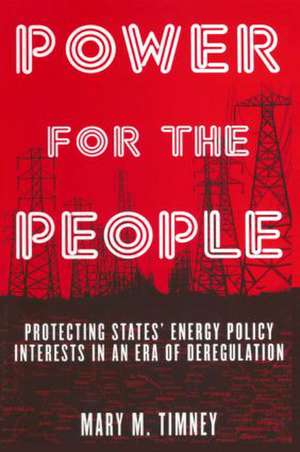Power for the People: Protecting States' Energy Policy Interests in an Era of Deregulation
Autor Mary M. Timneyen Limba Engleză Paperback – 31 aug 2004
| Toate formatele și edițiile | Preț | Express |
|---|---|---|
| Paperback (1) | 432.86 lei 43-57 zile | |
| Taylor & Francis – 31 aug 2004 | 432.86 lei 43-57 zile | |
| Hardback (1) | 1513.47 lei 43-57 zile | |
| Taylor & Francis – 31 mai 2004 | 1513.47 lei 43-57 zile |
Preț: 432.86 lei
Nou
Puncte Express: 649
Preț estimativ în valută:
82.84€ • 86.05$ • 68.81£
82.84€ • 86.05$ • 68.81£
Carte tipărită la comandă
Livrare economică 03-17 februarie 25
Preluare comenzi: 021 569.72.76
Specificații
ISBN-13: 9780765611499
ISBN-10: 076561149X
Pagini: 192
Dimensiuni: 152 x 229 x 12 mm
Greutate: 0.27 kg
Ediția:Revised
Editura: Taylor & Francis
Colecția Routledge
Locul publicării:Oxford, United Kingdom
ISBN-10: 076561149X
Pagini: 192
Dimensiuni: 152 x 229 x 12 mm
Greutate: 0.27 kg
Ediția:Revised
Editura: Taylor & Francis
Colecția Routledge
Locul publicării:Oxford, United Kingdom
Cuprins
Chapter 1 Introduction; Chapter 2 A Brief History of U.S. Energy Policy; Chapter 3 The States and Energy Policy, 1975–1995; Chapter 4 Restructuring Electricity; Chapter 5 Restructuring the California Electricity Market; Chapter 6 Restructuring in Other States; Chapter 7 State Energy Policy in 2001; Chapter 8 The Market and the States; Chapter 9 Balancing the Interests of the States and the Market; Chapter 10 The Future of Electricity Deregulation; Chapter 11 Public Policy and the Market; Chapter 12 Epilogue;
Notă biografică
Mary M. Timney is chair of the Department of Political Science at Pace University. For five years, she was professor of Public Administration at California State University, Hay ward, where she experienced the California electricity crisis firsthand. She has also been on the faculties of the University of Cincinnati and the University of Wisconsin-Green Bay. She holds an AB in chemistry from Bryn Mawr College and Master of Public Administration and Ph.D. in Public and International Affairs from the University of Pittsburgh.An activist in the environmental movement of the 1970s in Pittsburgh, she was environmental research associate for the Western Pennsylvania Conservancy. Later, as executive director of the Allegheny County Environmental Coalition, she implemented two grants from the U.S. Environmental Protection Agency and developed public education programs on transportation control strategies. While completing her Ph.D. in the early 1980s, she worked as energy project director in the city of Pittsburgh mayor’s office and designed an energy program budgeting system. In 1985, the governor of Wisconsin appointed her to a special task force to develop an energy policy plan. This work served as the base for a funded research project to investigate the development of state energy policies during the 1980s in the absence of federal energy policy leadership.Timney’s research and teaching interests are environmental policy, including environmental justice and sustainable development; public budgeting, public administration theory, and ethics; and public participation.
Descriere
This text examines the tension between the social and political interests of states and the market in the case of energy policy. It includes overviews of many other states, and offers analysis on how states can balance their own interests with the market without imposing high costs on their citizens or the environment.














